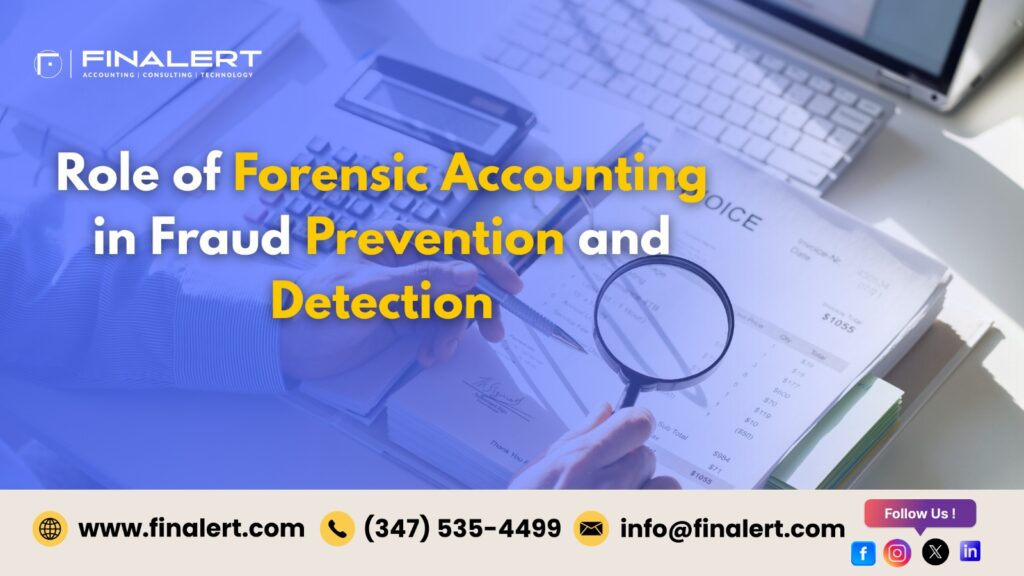Role of Forensic Accounting in Fraud Prevention and Detection
Introduction:
The threat of illegal activities poses a significant threat to businesses, governments and individuals alike. The complexity of financial transactions has led to cheats adopting sophisticated methods to manipulate accounts and embezzle funds. In this challenging landscape, forensic accounting has emerged as a vital tool to prevent, detect and investigate crime. Accounting knowledge combined with investigative techniques plays a crucial role in ensuring financial integrity and transparency.
What is Forensic Accounting?
Forensic accounting is a specialized field of accounting that involves the application of investigative and analytical skills to examine financial records for evidence of crime, embezzlement, money laundering or other financial crimes. It merges traditional accounting with investigative processes, focusing not only on compliance and reporting but also on legal support, investigation and risk management.
Forensic accountants often intersect with law enforcement, internal auditors, compliance officers and regulatory bodies.
Their expertise is crucial during legal proceedings, where financial evidence is required to prove fraudulent behavior or recover assets.
The Growing Need for Forensic Accounting
In today’s interconnected and digital economy, financial crime is no longer limited to embezzlement or theft. The criminals exploit internal controls weaknesses, manipulate data and hide illegal activities through advanced technologies. The risk of fraud increases as businesses expand and handle more complex financial operations.
Forensic accounting helps organizations stay one step ahead by identifying vulnerabilities and investigating suspicious transactions. Whether it’s detecting insider fraud, corruption or accounting irregularities, forensic accountants bring specialized knowledge and tools that traditional auditors or accountants may lack.
Key Areas Where Forensic Accounting Helps Fraud Prevention
1. Risk Assessment and Internal Controls
One of forensic accountants’ primary roles is to assess the organization’s existing risk framework. By evaluating internal controls, transaction processes and employee behavior, they identify holes that could be exploited. They recommend stronger control mechanisms, such as segregation of duties, regular audits, and automated transaction monitoring.
2. Employee Fraud Prevention
Employees often have access to sensitive financial data. Forensic accountants help develop ethical compliance programs and training sessions to educate staff on possible fraud. Transparency and accountability can create a culture of integrity that discourages fraud.
3. Vendor and Procurement Fraud Detection
Third-party vendors and suppliers pose significant fraud risks, especially in procurement and supply chain management. Forensic accountants examine contracts, payment patterns and invoice discrepancies to detect overbilling, kickbacks or unauthorized billing.
4. Data Analytics and Technology-Driven Detection
Modern forensic accounting integrates data analytics and artificial intelligence tools to uncover hidden patterns or anomalies within large datasets. Techniques like predictive modeling, transaction clustering and behavioral analysis enable forensic accountants to detect fraud in its early stages, before it escalates.
How Forensic Accounting Aids in Fraud Detection
1. Detailed Financial Investigations
Forensic accountants meticulously examine financial records, bank statements, tax filings and ledgers to uncover discrepancies. They follow the money trail to determine how funds were diverted or manipulated, helping organizations understand the scale and method of fraud.
2. Litigation and Expert Testimony
Forensic accountants are often called upon to provide expert testimony in fraud cases. Their detailed reports and findings assist legal teams in building strong cases, establishing intent, and recovering lost assets. Their expertise ensures that financial crimes are prosecuted effectively.
3. Fraudulent Transaction Identification
Forensic accountants are trained to identify red flags such as unusual transaction sizes, round-dollar payments, unexplained transfers or inflated invoices. Data points are cross-referenced, and transaction histories are scrutinized to uncover fraudulent activity patterns.
4. Asset Tracing and Recovery
Once fraud is detected, forensic accountants trace assets hidden, transferred or laundered. Working with law enforcement agencies to dismantle criminal networks, their work is critical in recovering funds and freezing accounts.
Benefits of Forensic Accounting in Fraud Prevention and Detection
Challenges in Forensic Accounting
Despite its benefits, forensic accounting does present some challenges. Investigations require extensive time and resources and criminals adapt to new methods. Additionally, forensic accountants must maintain objectivity, adhere to ethical standards and ensure confidentiality while managing sensitive financial information.
Conclusions
Organizations must prevent and detect scams in order to remain sustainable in the long term. Forensic accounting stands as a powerful line of defense, combining investigative expertise, analytical tools and ethical frameworks to safeguard businesses against false threats. Financial transparency and security are created by identifying risks, implementing robust controls, and thoroughly investigating suspicious activity.
Investing in forensic accounting at a time when financial crimes are becoming increasingly sophisticated is no longer optional it’s a necessity. Organizations that embrace forensic accounting not only protect their assets but also build trust, enhance credibility and ensure long-term growth.
